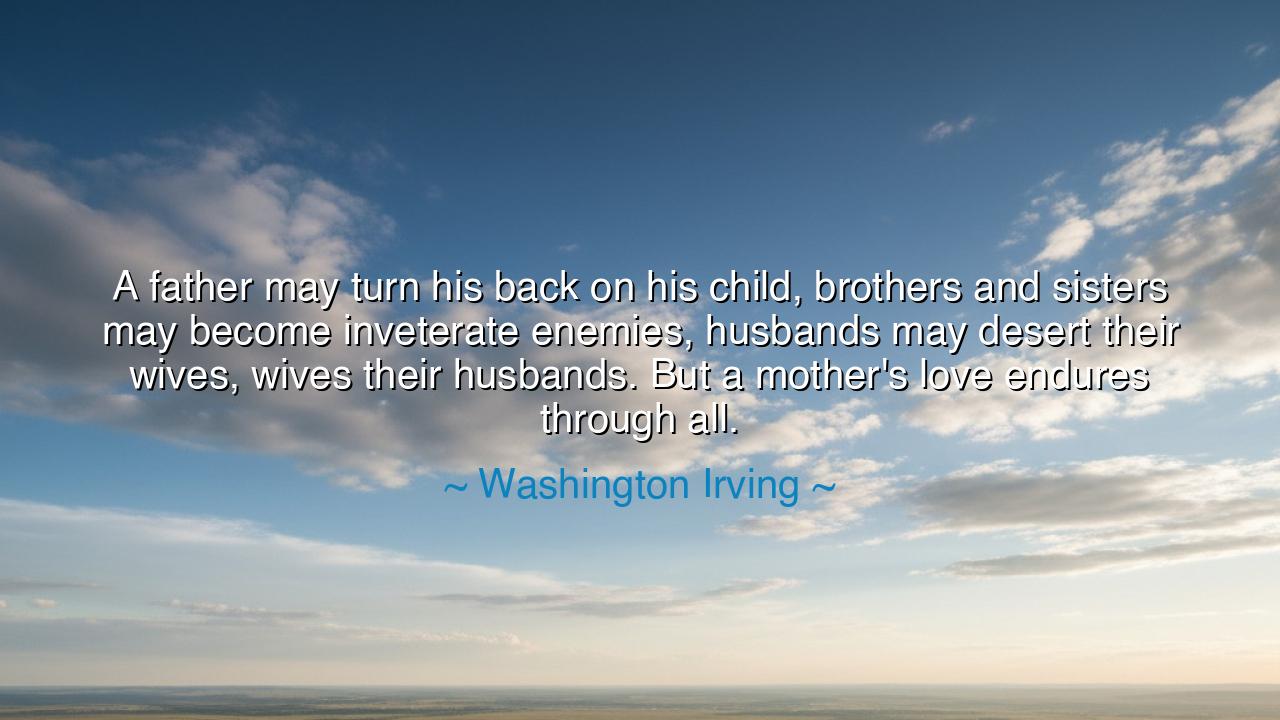
A father may turn his back on his child, brothers and sisters may
A father may turn his back on his child, brothers and sisters may become inveterate enemies, husbands may desert their wives, wives their husbands. But a mother's love endures through all.






In the immortal and tender words of Washington Irving, “A father may turn his back on his child, brothers and sisters may become inveterate enemies, husbands may desert their wives, wives their husbands. But a mother’s love endures through all,” we find a truth so ancient and so enduring that it transcends time, nation, and creed. Irving speaks of the eternity of a mother’s love—a love that, like the sun, may be obscured by clouds but never extinguished. It is the one affection in the human heart that does not depend upon worthiness, circumstance, or return. Others may falter, betray, or fade, but the mother’s heart remains constant, pulsing with devotion even in the face of rejection or pain. Hers is the love that mirrors the divine, unbroken even when all else turns to dust.
The origin of this quote lies in the 19th-century reflections of Washington Irving, one of America’s great literary voices, author of The Legend of Sleepy Hollow and Rip Van Winkle. Yet beneath his wit and artistry was a man of profound moral sensitivity. He lived in an age that glorified reason and independence, but through his writings, he reminded humanity of its moral core—of affection, loyalty, and compassion. His meditation on a mother’s love springs from both observation and reverence. He saw in the mother not merely a figure of nurture, but the sacred emblem of forgiveness and endurance—the heart that continues to beat for her child even when the world has turned its face away.
The ancients too understood this truth. In the myths of every civilization, the mother is the symbol of unconditional love—the divine vessel that gives without expectation. In Greek legend, Alcestis, wife and mother, willingly offers her life to save her husband, descending into death for love. In the East, the story of Madonna and Child is mirrored in countless forms—the mother as protector, as redeemer, as embodiment of compassion itself. And in the great texts of wisdom, from the Bhagavad Gita to the Bible, maternal love is likened to that of the Creator—patient, forgiving, enduring beyond measure. It is no wonder Irving saw in it the one flame that does not flicker, even when all others die.
To say that “a mother’s love endures through all” is to recognize the mystery of human affection at its highest form. The mother’s bond with her child begins before birth—formed not in words, but in heartbeat, in sacrifice, in silent vigil. It is a love that asks for nothing, that rejoices in the child’s joy and suffers in the child’s pain. When all others judge, she understands; when all others depart, she remains. Even when her child errs grievously, she does not cease to love—her heart may break, but it never hardens. Her love is the last refuge of the fallen, the last prayer of the lost.
Consider the story of Mary Johnson, an American mother whose son was murdered in 1993. The man who killed him, a boy named Oshea Israel, was only sixteen. For years, Mary’s heart was buried beneath grief and hatred. But as time passed, she began to feel the quiet voice of forgiveness rising within her—the same voice that had loved her son, now calling her to love even his killer. She reached out to Oshea, visited him in prison, and forgave him. When he was released, she took him in as her own. Together, they now speak to communities about reconciliation. In Mary’s actions, we see the living truth of Irving’s words: that even through devastation, a mother’s love endures—not because it is easy, but because it is eternal.
Irving’s words also remind us of life’s fragility and the impermanence of human bonds. Fathers, siblings, lovers, and friends—all these relationships can be shaken by pride, betrayal, or time. But a mother’s love is a different kind of covenant, written not on paper or vow, but upon the soul itself. Her love is the invisible thread that ties generations together, that carries the wisdom of ages, that forgives where reason cannot. It is both fierce and gentle, both sorrowful and serene—a divine paradox, born of humanity’s highest virtue: selfless compassion.
Let this truth be carried as a lesson for all generations: cherish the love that endures, for it is rarer than gold. To those who are mothers, remember the sacred power that lies within you—the ability to heal, to forgive, to endure when others cannot. To those who are children, honor your mothers not merely with words, but with understanding, with gratitude, with deeds. For her love has been your first shelter and will be your last comfort.
Thus, in the timeless words of Washington Irving, we find not only admiration, but revelation: that the love of a mother is the still point of a turning world—the one affection that neither pride nor distance can erase. All other loves may fade with season or circumstance, but hers remains like the roots of an ancient tree—deep, unseen, yet holding firm the ground upon which all life stands. A mother’s love endures through all—for it is not merely human, but eternal, and in it, we glimpse the face of divine mercy itself.






AAdministratorAdministrator
Welcome, honored guests. Please leave a comment, we will respond soon